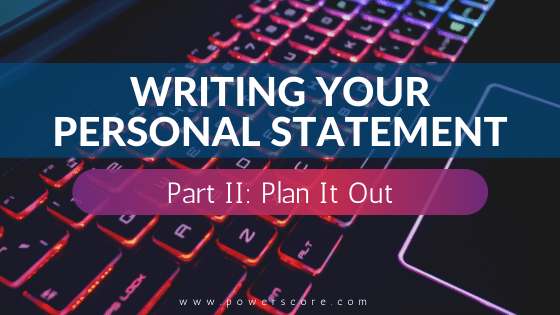Although all components of a law school application are important, the most important one is the personal statement. To that end, this series explains some of the pivotal points you should keep in mind as you prepare to write your law school application personal statement. This is a 10-part series that will help get you from starting to finishing your personal statement.
Plan It Out
In this second installment of our Writing Your Personal Statement series, we are going to talk about planning out your writing. Don’t underestimate the importance of brainstorming and outlining. Particularly, outlining. The brainstorming part is easy: start off with a broad idea of what you’re going to write about. Write everything you can think of down. This will provide a good base of topics to pull from. Next, you need to outline your essay. We recommend outlining multiple ideas. This will help you determine which ones are viable or not without spending a ton of time writing the essay itself. Although it may seem like a superfluous step, outlining before you go deep into the nuts and bolts of your essay does four very important things.
Make the Writing Process Easier
Ever try to start a college paper with a swiftly approaching deadline and found you had nothing to say? Or had a vague idea of what to say but didn’t know where to start? Outlining takes care of all that. Writing down a “skeleton” of your essay ensures that you’ll always have something to say. Even better, you’ll always know what comes next. A bonus is that you don’t have to start at the beginning when you have an outline. Start with the areas that come easy and then work your way through the rest.
Mental Revisions, Not Re-writing Sessions
Realizing halfway through a paper that what you’re writing about sucks is the worst. Spending hours writing a topic only to come to that conclusion is demotivating, so you (try) to make it work. And what happens with papers like that? They end up less-than-stellar and disappointing. By outlining first, you can weed out the boring or bad ideas before even having to dive into them. If you’re having a hard time outlining an idea, you can throw it out and try a new one with little investment.
Keep Your Writing In Check
Outlining your ideas ensures that your writing won’t take on a life of its own. It’s easy to to go on a tangent, it’s harder to rope yourself back in. Don’t let your mind wander and completely overtake where you’re going with the essay! It needs to remain organized and concise while sticking to the plan. If you create an outline, you’ll have an easier time staying on track and keep your personal statement engaging and interesting.
Consciousness of Word Limits
We know how you feel, and this goes hand-in-hand with keeping your writing in check. When you tell a story with yourself as the protagonist, you want to explain every detail and circumstance to make sure your readers know exactly what was happening at the time. The problem is that you can’t do that in the 800-1,000 word limit personal statements usually require. However, when you start writing with an outline, it’s harder to get carried away with the minute details. Instead of ending up with a 2,500+ word essay you have to cut down, you’ll naturally bridge concepts within your outline.
Trust the Process!
Outlining isn’t hard; as a matter of fact, it’s pretty easy. It’s nothing you haven’t done before! Think of all the bullet-point lists and five-paragraph-essay outlines you’ve done in your college career. Think of your essay topic, come up with key points you want to convey, turn each point into a paragraph, add supporting anecdotal information, and there you have it. A complete outline that will keep you in line. Of course, the more exhaustive and complex it is, the easier a time you’ll have writing your essay, but even a rudimentary outline is better than no outline at all.
Read More in This Series
- Take Your Time
- Plan It Out (You Are Here)
- Get Personal
- Get Specific
- Embrace Variety
- Step Away
- Edit
- Involve Others
- Proof
- Don’t Be Afraid
Subscribe to the blog to get notifications when we post new content!


Leave a Reply